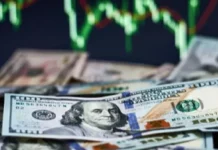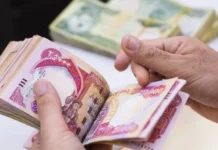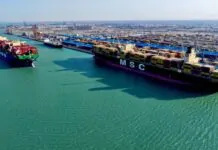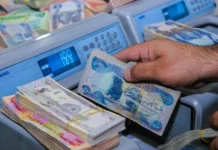Tishwash: The first of its kind in the region and Iraq as a whole.. Inauguration of an international financial and commercial center in Sulaymaniyah
On Thursday, an international financial and commercial center was inaugurated in the city of Sulaymaniyah. It is the first of its kind in the Kurdistan Region and the rest of Iraq in terms of specialization. Employees considered this a step to localize their salaries and end the crisis that has been ongoing for years .
Sulaymaniyah Governor, Haval Abu Bakr, said in a press conference attended by Shafak News Agency, during the opening ceremony of the center, “This center will provide a suitable environment for banks, financial markets and investment companies to work according to the legal frameworks approved in Iraq and the region .”
He added, “All banks, stock markets, financial and commercial institutions can establish branches within this center, according to the controls issued by the specialized authorities in the federal government and the region,” indicating that “this step constitutes a qualitative transformation in the financial and commercial sector of Sulaymaniyah, which enhances its position as an economic hub at the level of Iraq .”
In another context, a group of protesting teachers, who had previously demanded that their salaries be transferred directly from Baghdad, welcomed the decision to open two branches of the Central Bank in the region, and considered this step a prelude to implementing the Federal Court’s decision issued on February 21, 2024, which stipulates the “localization” of the salaries of the region’s employees through the federal government .
However, this issue is still controversial among political circles, as some believe that transferring salaries to Baghdad aims to undermine the regional government and influence its authority, while others consider it a necessary solution to end the crisis of delayed salaries that has been ongoing for more than ten years .
In this context, the governor of Sulaymaniyah explained that “the mechanism for distributing salaries has not yet been decided,” noting that “discussions are still ongoing about whether salaries will be distributed through the regional government as in previous years, or whether they will be transferred directly from Baghdad .”
While the opening of the financial and commercial center in Sulaymaniyah is an important step to boost economic activity, resolving the issue of salaries will remain an influential factor in financial and living stability in the region .
For more than a decade, Kurdistan cities have been suffering from a crisis of delayed salaries due to financial disputes between Baghdad and Erbil, which has prompted some groups, such as teachers and employees, to demand that their salaries be paid directly from the federal government .
On February 21, 2024, the Iraqi Federal Court issued a decision to localize the salaries of the region’s employees, but it has not been implemented yet due to administrative and political complications. The opening of the financial and commercial center in Sulaymaniyah constitutes a turning point in the economic scene, amidst the ongoing controversy over the future of financial management in the region . link
**
Tishwash: Government Advisor: No Problems in Financing the Budget for Salaries and Revenues Are Running Regularly
The Prime Minister’s Advisor for Financial Affairs, Mazhar Muhammad Salih, confirmed today, Thursday, the stability of cash resources and ensuring the flow of salaries and pensions. While he pointed out that government spending positively affects 85% of the movement of total demand, he pointed out that there are no problems in financing the budget for salaries and oil and non-oil revenues.
Saleh told the Iraqi News Agency (INA): “There are priorities in the state’s general budget that focus on ensuring the monthly flow of salaries for workers in the government sector and public companies, in addition to recipients of grants, wages, retirees and social care categories.”
He added that “the priorities come within the current section of the general budget,” stressing that “there are no problems in the flow of cash resources to the budget, whether from oil or non-oil revenues.”
Saleh explained that “what is being circulated about financial difficulties are imaginary scenarios aimed at creating a state of uncertainty,” noting that “about 8 million Iraqi citizens benefit from monthly payments that cover the needs of about 35 million Iraqis monthly through the family support system.”
He continued, “Coordination between monetary and fiscal policy works to provide the best performance and stability for monthly government spending, which is known as the “fiscal space,” which ensures speed and flexibility in financing fiscal policy in line with the “monetary space” in monetary policy.”
The Prime Minister’s advisor confirmed that “government spending constitutes about 50% of the country’s GDP annually, positively affecting more than 85% of the movement of total demand in Iraq, which supports the sustainability of economic activity and protects it from the risks of recession.”
He pointed out that “economic policy pays close attention to ensuring the timing of operational spending without interruption, as the annual inflation growth rate did not exceed 3%, which reflects precise control over the management of cash liquidity and public spending.”
He pointed out that “the stability and effectiveness of monetary and financial policies contribute to enhancing economic confidence and providing the necessary protection for the Iraqi economy from future challenges.” link
Tishwash: The Governor of the Central Bank, Ali Al-Alaq, confirmed that joint-stock companies constitute only 2% of the value of the gross domestic product in Iraq, while revealing the reason for the weak size of citizens’ deposits in banks.
Al-Alaq said during the opening and introduction of the International Center for Finance and Trade in Sulaymaniyah Governorate, which was followed by (Al-Rabia), that “financial centers are economic levers and need modern financial infrastructure and technologies,” noting “the importance of financial centers in stimulating the economy and attracting investments, which requires developing the financial infrastructure to keep pace with global changes.”0
He pointed out that “these centers focus on the most important engines of the economy,” stressing that “countries that have such centers have been able to achieve great achievements, as financial centers play a major role in stimulating and organizing the economy, as proven by reality, experience, numbers and data.”
He stressed that “the financial aspect in Iraq needs more vitality and innovation to harness resources towards growth and construction,” noting that “there is a huge amount of money inside the country, but it is not invested in the best way, as it is isolated from economic activity or hoarded without real benefit.”
He stressed that “this is a fundamental issue that requires thought, initiatives and innovations to invest this money to serve growth and employment,” noting that “the best way to attract and mobilize this money is to establish joint-stock companies that attract scattered capital, no matter how small its amounts are.” He pointed out that “Iraq suffers from a significant shortage” in joint-stock companies, as their contribution to the GDP is only 2% of the GDP, which is the lowest percentage in the region compared to the Middle East and North Africa countries, where the percentage reaches 55%, while in developed countries it ranges between 80% and 90%, which requires new ideas and centers capable of moving this field.”
The governor stressed that “Iraq has huge investment opportunities that can be exploited through partnerships between various capabilities, especially the available financial capabilities, but they do not find a clear scope for investment, which calls for a major role for financial centers in moving and establishing joint-stock companies in profitable strategic sectors.”
He also pointed to the weak volume of citizens’ deposits in banks, explaining that “the reason is not only due to lack of trust, but also to the availability of other investment opportunities that achieve greater returns than bank interest, as anyone can now invest their money through digital platforms and contribute to global projects without having to rely on traditional bank returns.”
The governor of the Central Bank provided an example of developments in digital investment, noting that “some The platforms allow a group of people to participate in purchasing real estate in global cities such as London, where investment is based on the highest potential returns globally.
He noted that “the world is witnessing a financial revolution supported by technology and artificial intelligence, which will lead to major transformations in the nature of economic activity,” noting that “the 10 largest companies in the world currently belong to the technology and communications sector, outperforming oil and traditional industry companies, as their market value ranges between 2-3 trillion dollars,” stressing that “banks in the near future will transform into fully smart electronic platforms, which will radically change the way financial and investment transactions are conducted.”
He stressed the “necessity of transforming financial centers into strong economic levers, so that they play a fundamental role in attracting investments, regulating financial flows, and benefiting from modern technologies,” indicating that “this center has a major task ahead of it to move in these directions.” The Central Bank reveals the reason for the weakness of citizens’ deposits in banks: The money is huge link
************
Tishwash: King Salman approves Saudi Riyal currency symbol
The Saudi monarch, King Salman bin Abdulaziz Al Saud, approved today, Thursday, the symbol of the Saudi riyal currency in a historic step aimed at strengthening the identity of the national currency.

According to the Saudi Press Agency (SPA), the Governor of the Saudi Central Bank (SAMA), Ayman bin Mohammed Al-Sayyari, expressed his thanks and appreciation to the Custodian of the Two Holy Mosques, King Salman bin Abdulaziz Al Saud, and to the Crown Prince Mohammed bin Salman, Prime Minister, on the occasion of the launch of the Saudi riyal currency symbol.
Al-Siyari explained that the decision contributes to strengthening the Kingdom’s financial identity at the local, regional and international levels, noting that the application of the currency symbol will begin gradually, as it will be included in financial and commercial transactions and various applications in coordination with the relevant authorities.
Al-Siyari pointed out that this initiative aims to encourage pride in national identity and cultural affiliation, as well as highlight the status of the Saudi riyal and enhance confidence in it, as well as highlight the Kingdom’s prominent role among major global economies and G20 countries.
According to the agency, the national currency symbol, which was designed according to the highest technical standards, reflects the Kingdom’s culture and rich heritage. The symbol bears the name of the national currency “SAR” with a design inspired by Arabic calligraphy, and enhances the representation of the Saudi riyal in the local, regional and international context, making it suitable for use in all financial and commercial transactions. link





